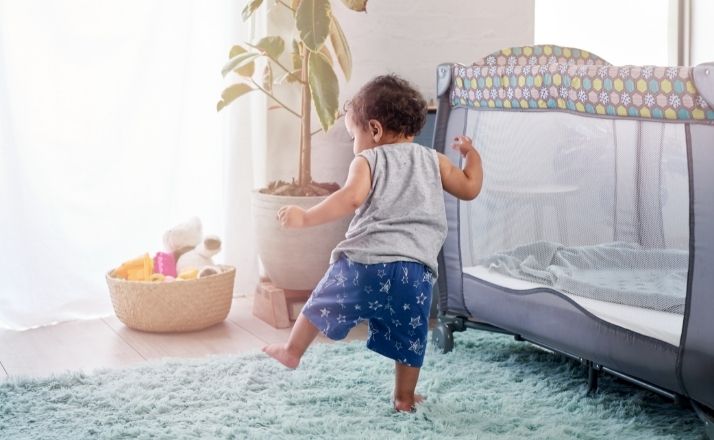Few things in life are as exciting as watching your baby’s first steps. As their baby scoots, crawls, and begins to pull up on furniture, many parents begin to wonder, “When do babies walk?”
As with so many other first year milestones and developments, the answer varies widely.
Some babies may take as long as eighteen months before they walk independently. Other babies are walking all over the place before they even utter their first word, some as young as eight months.
Regardless of when your baby walks, most babies follow a fairly predictable progression toward their first steps.
Gross motor skills that develop before babies can walk
Walking requires babies to have a lot of control over their bodies. They need the motor skills to properly move their limbs and they need balance and core control to stay upright. Plus, let’s not forget they need to account for their relatively giant head.
One of the first motor skills in this process is rolling over. When babies can roll over from front to back and back to front, they are on the road to significant movement.
One of my babies could travel a fairly impressive distance just by barrel-rolling across the floor. (That boy remains our wild child to this day . . . but I digress.)
After rolling, babies begin sitting independently somewhere between six and nine months. Sitting up may not seem like much, but it’s a pretty impressive feat when you consider the amount of core control babies need to balance those big noggins.
Crawling is a huge developmental leap forward –- requiring the coordination of just as many muscle groups as walking (although, admittedly, the balance piece is easier). This stage happens for most babies somewhere between six and nine months.

Pulling up and cruising – the last steps before those first steps
Once a baby begins to stand and pull up on furniture, it’s anybody’s guess when they will begin to walk.
Some babies continue “cruising” for months, grabbing from couch to ottoman to chair –- using whatever furniture is available to navigate their way around the room. Others make only a brief pit-stop as a furniture-cruiser, moving on quickly to full-fledged walking.
On average, babies take their first steps anywhere from eight months to eighteen months, with between twelve and fourteen months being the most common.
Are there things you can do to encourage your baby to walk?
This post contains Amazon affiliate links. If you click on a link, Filter Free Parents may receive a commission. See our full disclosure policy HERE.
Yes and no. You can give your baby plenty of opportunities to strengthen their muscles and practice gross motor skills. You can encourage them positively when they stand on their own or attempt a few steps. Comfort them when they fall.
You can even use stationary baby exercise apparatuses like Jumperoos or Baby Spin and Stands like these. Just don’t use mobile walkers –- the AAP has been clear that these pose a significant risk to babies.
On the other hand, don’t pressure them. Don’t force your baby to try standing or to take steps if they don’t want to. You want walking to be a fun, positive experience. Your baby should enjoy exploring the world around them.
In the end, you can’t really rush child development. Your baby will walk when they’re ready. And once they do, watch out world, here they come!











